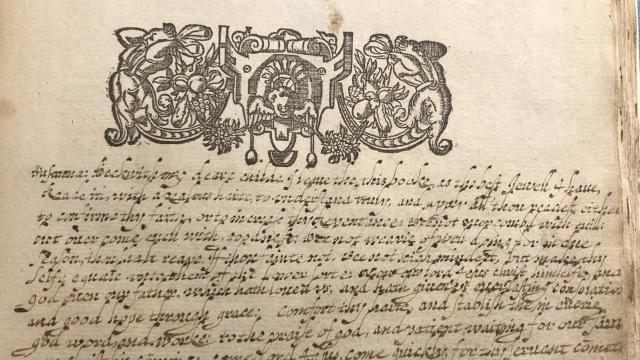
British Library General Reference Collection 464.c.5, Apocrypha 77r
This thesis examines women’s education in sixteenth and seventeenth century England using marginalia as a case study for how educational skills were learned and practiced. By first tracing the development of women’s education across two centuries, using evidence from letters, diary entries, advertisements, and biographical writing, I aim to demonstrate the varied ways in which women came to be educated during this time period. I argue that, while formal schooling for girls did exist, turning our focus to how literacy was developed in a domestic setting gives us insight into not only how a large number of women were educated, but also how books were used in the early modern household, and what it means to be a part of a literate environment. Our understanding of women’s education is complicated not only by gender, but by various environmental and social factors such as class, religion, geography, and time period. I propose that we move beyond a ‘deficit’ model of studying women’s education that compares it negatively against a humanist ideal promoted by élite men at court, and instead place various forms of evidence alongside one another to reveal the progress of women’s education across these two centuries as complex, non-linear, and non-exclusive.
By using women’s marginalia as an evidence base, I aim to further illuminate not just what women learned, but the educational processes through which they did so. This thesis categorises marginalia as either ‘direct’ or ‘indirect’, referring to marks that respond directly to the text they surround, and those that do not. In doing so, I argue that we are able to examine marginalia not just as evidence of literacy, but also of textual interpretation and original writing. Much evidence of women’s education from this period is sporadic and fragmentary; the benefit of marginalia is that it helps to fill in some of these gaps by showing actual educational processes in progress, from learning how to form letters, to intertextual citation, to original compositions in response to a text. This thesis contributes to a growing field within early modern book history that increasingly views marginalia as a significant evidence base for understanding women’s history. I argue that in studying it as a form of education, we can better understand early modern literacy, both the physical book and the household as pedagogical spaces, and women’s contribution to the intellectual environment of sixteenth and seventeenth century England.
Speaker: Hannah Upton is a PhD student at Australian National University researching early modern women's education, using marginalia as a case study for how we can understand how learning took place in both in the schoolroom and at home. Since 2021, she has been an HDR candidate and research assistant for the ARC-funded Future Fellowship Marginalia and the Early Modern Woman Writer, 1530-1660. She is a member of the Parergon journal Early Career Committee, and her chapter 'The Family Bible and the Early Modern Woman Reader' will be published in Inheriting the Family: Objects, Identities and Emotions in February 2025.
This seminar will be presented on Zoom
Meeting ID: 830 4116 9560
Password: 990583
Location
Speakers
- Hannah Upton
Contact
- HAL Admin